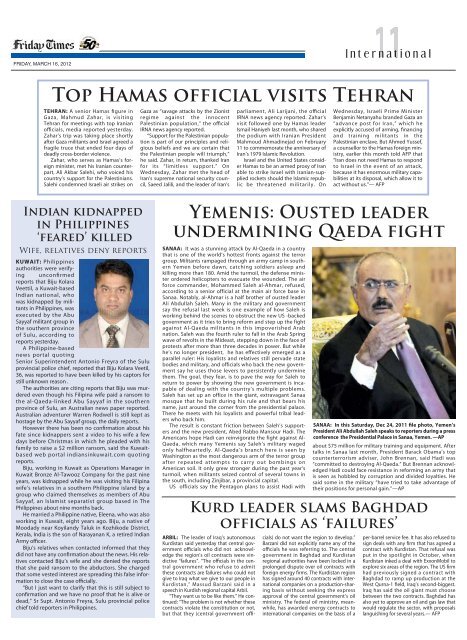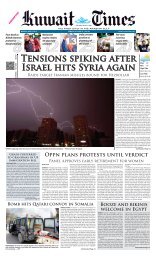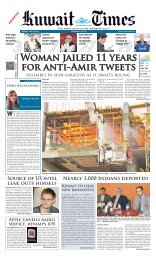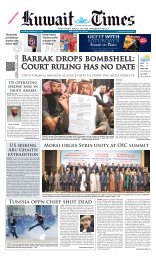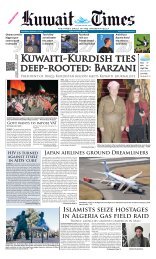otics may lead to future antibiotic-resistant infec - Kuwait Times
otics may lead to future antibiotic-resistant infec - Kuwait Times
otics may lead to future antibiotic-resistant infec - Kuwait Times
Create successful ePaper yourself
Turn your PDF publications into a flip-book with our unique Google optimized e-Paper software.
FRIDAY, MARCH 16, 2012<br />
TEHRAN: A senior Hamas figure in<br />
Gaza, Mahmud Zahar, is visiting<br />
Tehran for meetings with <strong>to</strong>p Iranian<br />
officials, media reported yesterday.<br />
Zahar’s trip was taking place shortly<br />
after Gaza militants and Israel agreed a<br />
fragile truce that ended four days of<br />
deadly cross-border violence.<br />
Zahar, who serves as Hamas’s foreign<br />
minister, met his Iranian counterpart,<br />
Ali Akbar Salehi, who voiced his<br />
country’s support for the Palestinians.<br />
Salehi condemned Israeli air strikes on<br />
Gaza as “savage attacks by the Zionist<br />
regime against the innocent<br />
Palestinian population,” the official<br />
IRNA news agency reported.<br />
“Support for the Palestinian population<br />
is part of our principles and religious<br />
beliefs and we are certain that<br />
the Palestinian people will triumph,”<br />
he said. Zahar, in return, thanked Iran<br />
for its “limitless support.” On<br />
Wednesday, Zahar met the head of<br />
Iran’s supreme national security council,<br />
Saeed Jalili, and the <strong>lead</strong>er of Iran’s<br />
parliament, Ali Larijani, the official<br />
IRNA news agency reported. Zahar’s<br />
visit followed one by Hamas <strong>lead</strong>er<br />
Ismail Haniyeh last month, who shared<br />
the podium with Iranian President<br />
Mahmoud Ahmadinejad on February<br />
11 <strong>to</strong> commemorate the anniversary of<br />
Iran’s 1979 Islamic Revolution.<br />
Israel and the United States consider<br />
Hamas <strong>to</strong> be an armed proxy of Iran<br />
able <strong>to</strong> strike Israel with Iranian-supplied<br />
rockets should the Islamic republic<br />
be threatened militarily. On<br />
International<br />
Top Hamas official visits Tehran<br />
Indian kidnapped<br />
in Philippines<br />
‘feared’ killed<br />
Wife, relatives deny reports<br />
KUWAIT: Philippines<br />
authorities were verifying<br />
unconfirmed<br />
reports that Biju Kolara<br />
Veettil, a <strong>Kuwait</strong>-based<br />
Indian national, who<br />
was kidnapped by militants<br />
in Philippines, was<br />
executed by the Abu<br />
Sayyaf militant group in<br />
the southern province<br />
of Sulu, according <strong>to</strong><br />
reports yesterday.<br />
A Philippine-based<br />
news portal quoting<br />
Senior Superintendent An<strong>to</strong>nio Freyra of the Sulu<br />
provincial police chief, reported that Biju Kolara Veetil,<br />
36, was reported <strong>to</strong> have been killed by his cap<strong>to</strong>rs for<br />
still unknown reason .<br />
The authorities are citing reports that Biju was murdered<br />
even though his Filipina wife paid a ransom <strong>to</strong><br />
the al-Qaeda-linked Abu Sayyaf in the southern<br />
province of Sulu, an Australian news paper reported.<br />
Australian adventurer Warren Rodwell is still kept as<br />
hostage by the Abu Sayyaf group, the daily reports.<br />
However there has been no confirmation about his<br />
fate since kidnappers sent a video <strong>to</strong> his wife a few<br />
days before Christmas in which he p<strong>lead</strong>ed with his<br />
family <strong>to</strong> raise a $2 million ransom, said the <strong>Kuwait</strong>based<br />
web portal indiansinkuwait.com quoting<br />
reports.<br />
Biju, working in <strong>Kuwait</strong> as Operations Manager in<br />
<strong>Kuwait</strong> Bronze Al-Tawooz Company for the past nine<br />
years, was kidnapped while he was visiting his Filipina<br />
wife’s relatives in a southern Philippine island by a<br />
group who claimed themselves as members of Abu<br />
Sayyaf, an Islamist separatist group based in The<br />
Philippines about nine months back.<br />
He married a Philippine native, Eleena, who was also<br />
working in <strong>Kuwait</strong>, eight years ago. Biju, a native of<br />
Moodady near Koyilandy Taluk in Kozhikode District,<br />
Kerala, India is the son of Narayanan K, a retired Indian<br />
Army officer.<br />
Biju’s relatives when contacted informed that they<br />
did not have any confirmation about the news. His relatives<br />
contacted Biju’s wife and she denied the reports<br />
that she paid ransom <strong>to</strong> the abduc<strong>to</strong>rs. She charged<br />
that some vested interest are spreading this false information<br />
<strong>to</strong> close the case officially.<br />
“But I just want <strong>to</strong> clarify that this is still subject <strong>to</strong><br />
confirmation and we have no proof that he is alive or<br />
dead,” Sr Supt. An<strong>to</strong>nio Freyra, Sulu provincial police<br />
chief <strong>to</strong>ld reporters in Philippines.<br />
SANAA: It was a stunning attack by Al-Qaeda in a country<br />
that is one of the world’s hottest fronts against the terror<br />
group. Militants rampaged through an army camp in southern<br />
Yemen before dawn, catching soldiers asleep and<br />
killing more than 180. Amid the turmoil, the defense minister<br />
ordered helicopters <strong>to</strong> evacuate the wounded. The air<br />
force commander, Mohammed Saleh al-Ahmar, refused,<br />
according <strong>to</strong> a senior official at the main air force base in<br />
Sanaa. Notably, al-Ahmar is a half brother of ousted <strong>lead</strong>er<br />
Ali Abdullah Saleh. Many in the military and government<br />
say the refusal last week is one example of how Saleh is<br />
working behind the scenes <strong>to</strong> obstruct the new US -backed<br />
government as it tries <strong>to</strong> bring reform and step up the fight<br />
against Al-Qaeda militants in this impoverished Arab<br />
nation. Saleh was the fourth ruler <strong>to</strong> fall in the Arab Spring<br />
wave of revolts in the Mideast, stepping down in the face of<br />
protests after more than three decades in power. But while<br />
he’s no longer president, he has effectively emerged as a<br />
parallel ruler: His loyalists and relatives still pervade state<br />
bodies and military, and officials who back the new government<br />
say he uses those levers <strong>to</strong> persistently undermine<br />
them. The goal, they fear, is <strong>to</strong> pave the way for Saleh <strong>to</strong><br />
return <strong>to</strong> power by showing the new government is incapable<br />
of dealing with the country’s multiple problems.<br />
Saleh has set up an office in the giant, extravagant Sanaa<br />
mosque that he built during his rule and that bears his<br />
name, just around the corner from the presidential palace.<br />
There he meets with his loyalists and powerful tribal <strong>lead</strong>ers<br />
who back him.<br />
The result is constant friction between Saleh’s supporters<br />
and the new president, Abed Rabbo Mansour Hadi. The<br />
Americans hope Hadi can reinvigorate the fight against Al-<br />
Qaeda, which many Yemenis say Saleh’s military waged<br />
only halfheartedly. Al-Qaeda’s branch here is seen by<br />
Washing<strong>to</strong>n as the most dangerous arm of the terror group<br />
after repeated attempts <strong>to</strong> carry out bombings on<br />
American soil. It only grew stronger during the past year’s<br />
turmoil, when militants seized control of several <strong>to</strong>wns in<br />
the south, including Zinjibar, a provincial capital.<br />
US officials say the Pentagon plans <strong>to</strong> assist Hadi with<br />
Wednesday, Israeli Prime Minister<br />
Benjamin Netanyahu branded Gaza an<br />
“advance post for Iran,” which he<br />
explicitly accused of arming, financing<br />
and training militants in the<br />
Palestinian enclave. But Ahmed Yussef,<br />
a counsellor <strong>to</strong> the Hamas foreign ministry,<br />
earlier this month <strong>to</strong>ld AFP that<br />
“Iran does not need Hamas <strong>to</strong> respond<br />
<strong>to</strong> Israel in the event of an attack,<br />
because it has enormous military capabilities<br />
at its disposal, which allow it <strong>to</strong><br />
act without us.”— AFP<br />
Yemenis: Ousted <strong>lead</strong>er<br />
undermining Qaeda fight<br />
SANAA: In this Saturday, Dec 24, 2011 file pho<strong>to</strong>, Yemen’s<br />
President Ali Abdullah Saleh speaks <strong>to</strong> reporters during a press<br />
conference the Presidential Palace in Sanaa, Yemen. —AP<br />
about $75 million for military training and equipment. After<br />
talks in Sanaa last month, President Barack Obama’s <strong>to</strong>p<br />
counterterrorism adviser, John Brennan, said Hadi was<br />
“committed <strong>to</strong> destroying Al-Qaeda.” But Brennan acknowledged<br />
Hadi could face resistance in reforming an army that<br />
is seen as hobbled by corruption and divided loyalties. He<br />
said some in the military “have tried <strong>to</strong> take advantage of<br />
their positions for personal gain.”—AP<br />
Kurd <strong>lead</strong>er slams Baghdad<br />
officials as ‘failures’<br />
ARBIL: The <strong>lead</strong>er of Iraq’s au<strong>to</strong>nomous<br />
Kurdistan said yesterday that central government<br />
officials who did not acknowledge<br />
the region’s oil contracts were vindictive<br />
“failures”. “The officials in the central<br />
government who refuse <strong>to</strong> admit<br />
these contracts are failures who could not<br />
give <strong>to</strong> Iraq what we give <strong>to</strong> our people in<br />
Kurdistan,” Massud Barzani said in a<br />
speech in Kurdish regional capital Arbil.<br />
“They want us <strong>to</strong> be like them.” He continued:<br />
“The problem is not whether these<br />
contracts violate the constitution or not,<br />
but that they (central government offi-<br />
cials) do not want the region <strong>to</strong> develop.”<br />
Barzani did not explicitly name any of the<br />
officials he was referring <strong>to</strong>. The central<br />
government in Baghdad and Kurdistan<br />
regional authorities have been locked in a<br />
prolonged dispute over oil contracts with<br />
foreign energy firms. The Kurdistan region<br />
has signed around 40 contracts with international<br />
companies on a production-sharing<br />
basis without seeking the express<br />
approval of the central government’s oil<br />
ministry. The federal oil ministry, meanwhile,<br />
has awarded energy contracts <strong>to</strong><br />
international companies on the basis of a<br />
per-barrel service fee. It has also refused <strong>to</strong><br />
sign deals with any firm that has agreed a<br />
contract with Kurdistan. That refusal was<br />
put in the spotlight in Oc<strong>to</strong>ber, when<br />
Kurdistan inked a deal with ExxonMobil <strong>to</strong><br />
explore six areas of the region. The US firm<br />
had previously signed a contract with<br />
Baghdad <strong>to</strong> ramp up production at the<br />
West Qurna-1 field, Iraq’s second-biggest.<br />
Iraq has said the oil giant must choose<br />
between the two contracts. Baghdad has<br />
also yet <strong>to</strong> approve an oil and gas law that<br />
would regulate the sec<strong>to</strong>r, with proposals<br />
languishing for several years.— AFP


